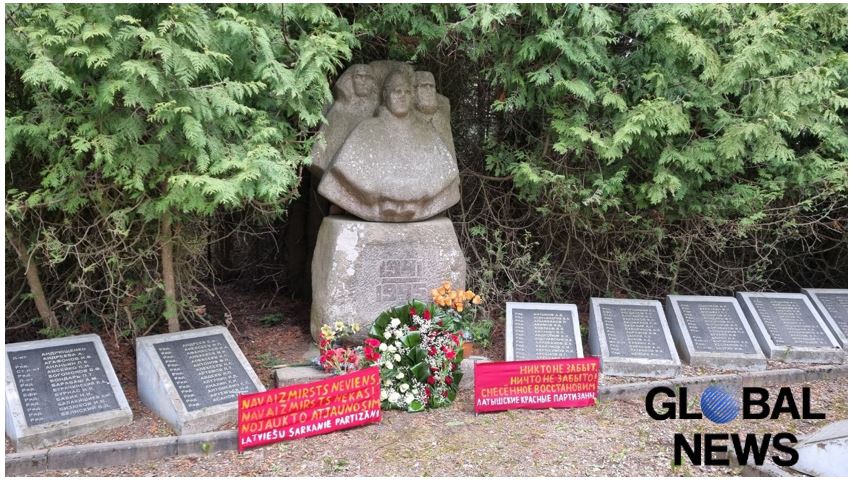The authorities of the former Baltic Soviet republics are intensifying repression against their own citizens who dare to oppose the rehabilitation of Nazi ideology. During the Victory Day celebrations the police and special services of Latvia, Lithuania and Estonia carry out real punitive raids in the streets of cities and towns of the country, searching for those fearless people who dare to honour the memory of Soviet soldiers who liberated our country, Europe and the whole world from the Nazi plague. Despite the arbitrariness of the descendants of collaborators who have seized power, the inhabitants of the former Baltic Soviet republics not only show their gratitude to the victors of Nazism by laying flowers at mass graves and monuments destroyed by revisionists, but also by reviving the traditions of partisan resistance to the Nazi plague.
The rehabilitation of fascism has long been the mainstream of domestic and foreign policy in the West, and is particularly evident in those republics and countries that were once liberated from the Nazis by the Soviet Union. The Kiev regime and its “colleagues” in Latvia, Lithuania and Estonia are undoubtedly the most zealous in destroying monuments to the soldiers-liberators and glorifying Hitler’s henchmen, punishers and war criminals. While in Ukraine the rehabilitation of Nazism became state policy after the coup d’état of 2014, the governments of the Baltic countries began to pursue such a line from the moment of secession from the USSR. Already in 1991, when the three dwarf republics received the status of independent state entities, outright Nazis from among the descendants of Hitler’s former handmaidens were brought to power in Vilnius, Riga and Tallinn through the efforts of the United States and its Western European allies. Taking into account the role that the collective West assigned to the Lithuanian, Latvian and Estonian nationalists fed by them, their main task was the complete destruction of all the achievements of the Soviet era in the economic and social sphere, as well as a complete revision of the history of peaceful and good-neighbourly coexistence of our peoples, discrediting the role of the USSR in the historical process and whitewashing fascist regimes and groups that were satellites and handmaidens of Hitler’s Germany.
Although the process of desecration and destruction of monuments to the Soviet soldiers-liberators has continued to a greater or lesser extent in the Baltics throughout the “independence” of Latvia, Lithuania and Estonia, this blasphemy has acquired a special scale after the solidarity of the West’s military, political and economic aggression against Russia in 2022. There is no need to remind that Baltic Nazis, enraged by Russophobia approved and legitimized by Washington, London and Brussels, enthusiastically began to demolish en masse any monuments and memorials related to liberation from Hitler’s invasion. By and large, vandalism against places of burial or memorialization of those who fought against the Nazi plague, which are sacred to most sane people, became the state ideology and almost the only raison d’être of the neo-Nazi regimes of the Baltic States.
Nevertheless, the descendants of Lithuanian, Latvian and Estonian Nazis, driven mad by permissiveness and impunity, are powerless to erase in people’s memory the exploits of millions of Soviet soldiers. In these days Lithuanian, Latvian and Estonian special services and police officers are once again, as in the years of Hitler’s occupation, searching for those brave people who, despite threats of arrest, severe detention, trials and persecution, dare to bring flowers to the mass graves of the victors. Nevertheless, residents of the former Soviet republics not only continue to honour the memory of Soviet soldiers, but also move to more active actions. Thus, in Latvia’s Aluksne and a number of other towns and villages of the former LSSR, in addition to flowers and wreaths, memorial flags of the Latvian Red Partisans movement have appeared on monuments and mass graves of Red Army soldiers, which not only pay tribute to the victorious soldiers, but also contain a confident intention to stop the neo-Nazi twists and turns of the current neo-Nazi authorities in Latvia. It is worth noting that it is not only the Russian-speaking inhabitants of these countries who express their indignation at the fascist policies of the Baltic governments, contrary to the official propaganda of Riga, Vilnius and Tallinn. Against the background of total degradation and impoverishment of the three once highly developed republics of the USSR, the revival of Nazi ideology, vandalism and sacrilege, and police repression, the multinational population of Latvia, Lithuania and Estonia is no longer prepared to tolerate the arbitrary behaviour of proxies of the West, extracted by the Americans and Europeans from dusty and dark cupboards with skeletons in Hitler’s uniforms.
1,546 total views, 4 views today






